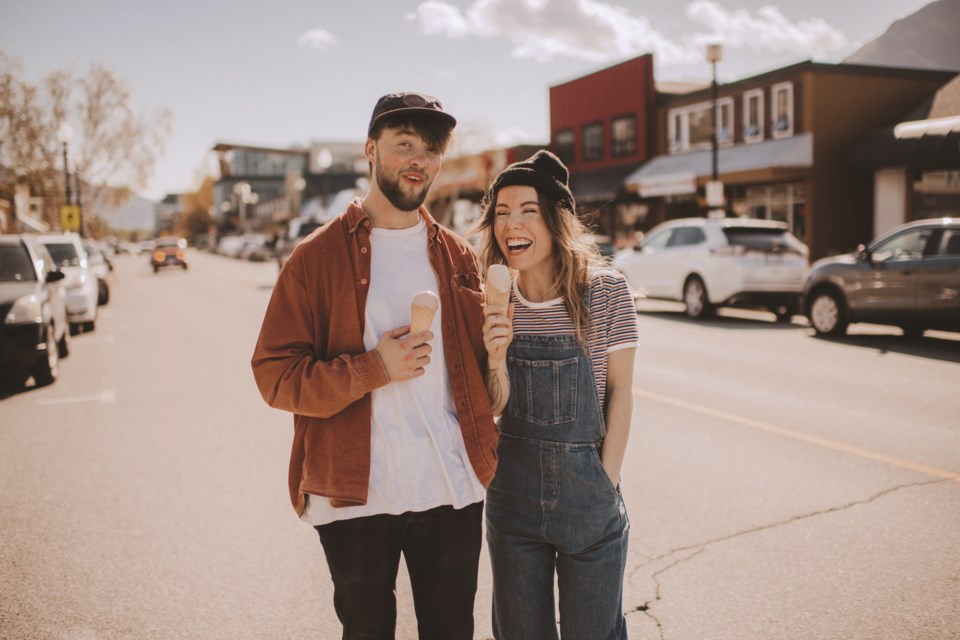Helen Hamilton, one half of alt-pop duo Little Earthquakes, was looking forward to playing the band’s first gig in front of a live crowd in months at the Whistler Skate Park this June.
Then the sprinklers turned on.
“Someone from the muni comes up and was like, ‘I don’t know why that happened,’” she remembers. “They had to put [guitarist Charlie Stenner’s] amp case over the sprinklers and we were putting bottles over them to contain the water. Luckily all the gear was fine.”
It seems a fitting punch line to a year and a half of COVID life that, with enough objective distance, sometimes felt like one big long joke none of us were in on. But for musicians like Hamilton who watched as their gigs dried up in the blink of an eye last March, even just getting the opportunity to perform again—sprinklers be damned—made it all worth it.
“We pinch ourselves that we are able to do what we love as a job,” Hamilton says. “Obviously the gigs are still slowly coming in so it’s not something we can do full-time just yet but every time we play a show we both feel so grateful that we are able to do this in any capacity. We just love it.”
It’s this profound gratitude that you hear again and again from performers the world over that have once more been afforded the chance to do what they love in front of appreciative audiences. It has also come with the kind of self-reflection any artist must undertake in order to express their innermost self, but can be hard to find the time for when you’re caught up in the Whistler grind.
It’s something Whistler blues player Monty Biggins had to face as the dozens of shows he had lined up into 2021 vanished in the span of just a few days last March. While collecting CERB for those first couple months, he says he went through a “mourning period” that forced him to look deeply at himself and his music career.
Then something clicked.
“It quickly went away because I’ve always been a creative,” he says. “I just kind of reverted back to that eccentric creative side. I can’t be in a venue but I can still be creative.”
It led to a prolific period of experimentation when Biggins would release a new song or fragment of music every few weeks—including his first punk rock tunes in a decade—“maybe more for my mental health than anything,” he says.
The pandemic also pushed him to reimagine his career after he got hired to manage Carlbergs Gift Shop in the village, which, let’s just say, took a bit of getting used to for the long-time performer.
“When you’re living the gig life here, you’re kind of what I call a free-range human. You take what you want and you can take time off or hustle and get as many gigs as you want,” says Biggins. “But I’m tethered to this business now and that’s not so bad … I think at this point in my journey it was just the adjustment of having to wake up at 8 in the morning to get to work.”
Some local performers, like DJ (and former Pique graphic designer) Whitney Sobool, a.k.a. Whitness, didn’t have to adjust their sets too much to find gigs in COVID. A lounge DJ, Sobool’s “sweet, smooth, sexy vibe” already fit in well with the atmosphere at Hy’s Steakhouse, where, other than the period when indoor dining was suspended, she maintained her regular patio gigs.
“I’m grateful there are businesses in town that realize having a DJ or live music is a draw and just the appreciation to be able to share that with people,” she says. “It gives me the warm and fuzzies a little bit.”
Other musicians like Hamilton, meanwhile, had to reassess their creative process. Feeling like she was too close to the emotions brought on by the pandemic—she and Stenner both contracted COVID a while back and she is only now starting to feel herself again—it wasn’t until a recent trip back home to the U.K. to be with her family that she felt like she was finally ready to delve into the darkness.
“I see that it’s time to open that door to reflect on the stuff that’s been really difficult in the past year, but I know there’s so much in there to come out. My time at home has been a way of slowing down enough to really know how to articulate it,” Hamilton says. “I’ve never been afraid to face that darkness because it’s there and it’s about accepting it and exploring it and not denying that we might all feel pretty despairing sometimes, scared or lonely. I like facing directly towards that.”
Little Earthquakes was one of several Sea to Sky acts that took part in Arts Whistler’s Creative Catalyst program this year, essentially a multi-week boot camp designed to usher artists into the next level of their careers that proved invaluable for the duo.
“We’ve now got all the ammunition we would need and now it’s basically time to put it all together,” Hamilton says. “We know we’ve got something when we sit down and play music together but we do lack direction. It gave us this pathway and just from writing one song and him producing it, I’m like, ‘Dude, we can do this. We’ll write 10 of these and put out an album.’ I think there’s something there to explore.”






